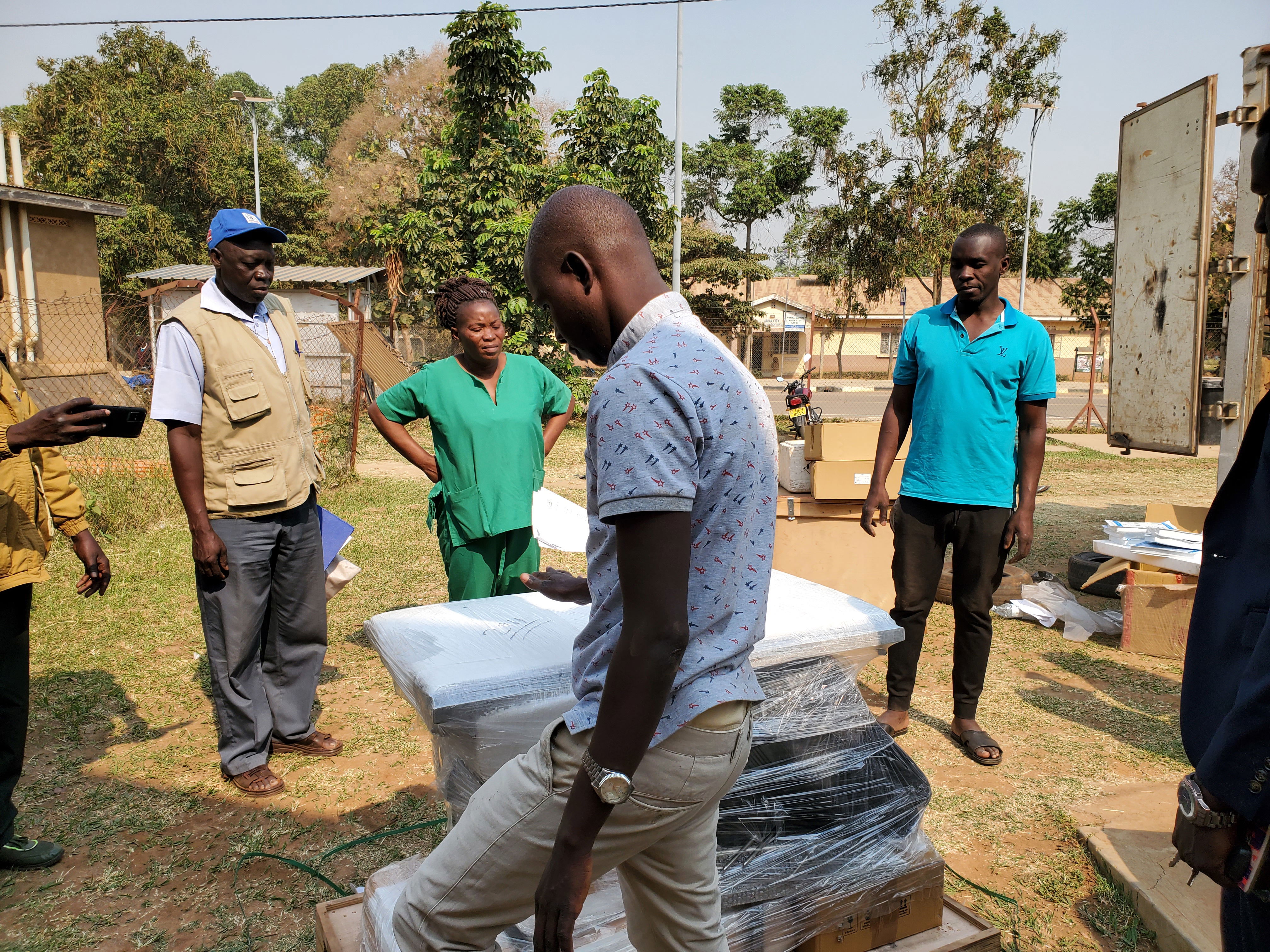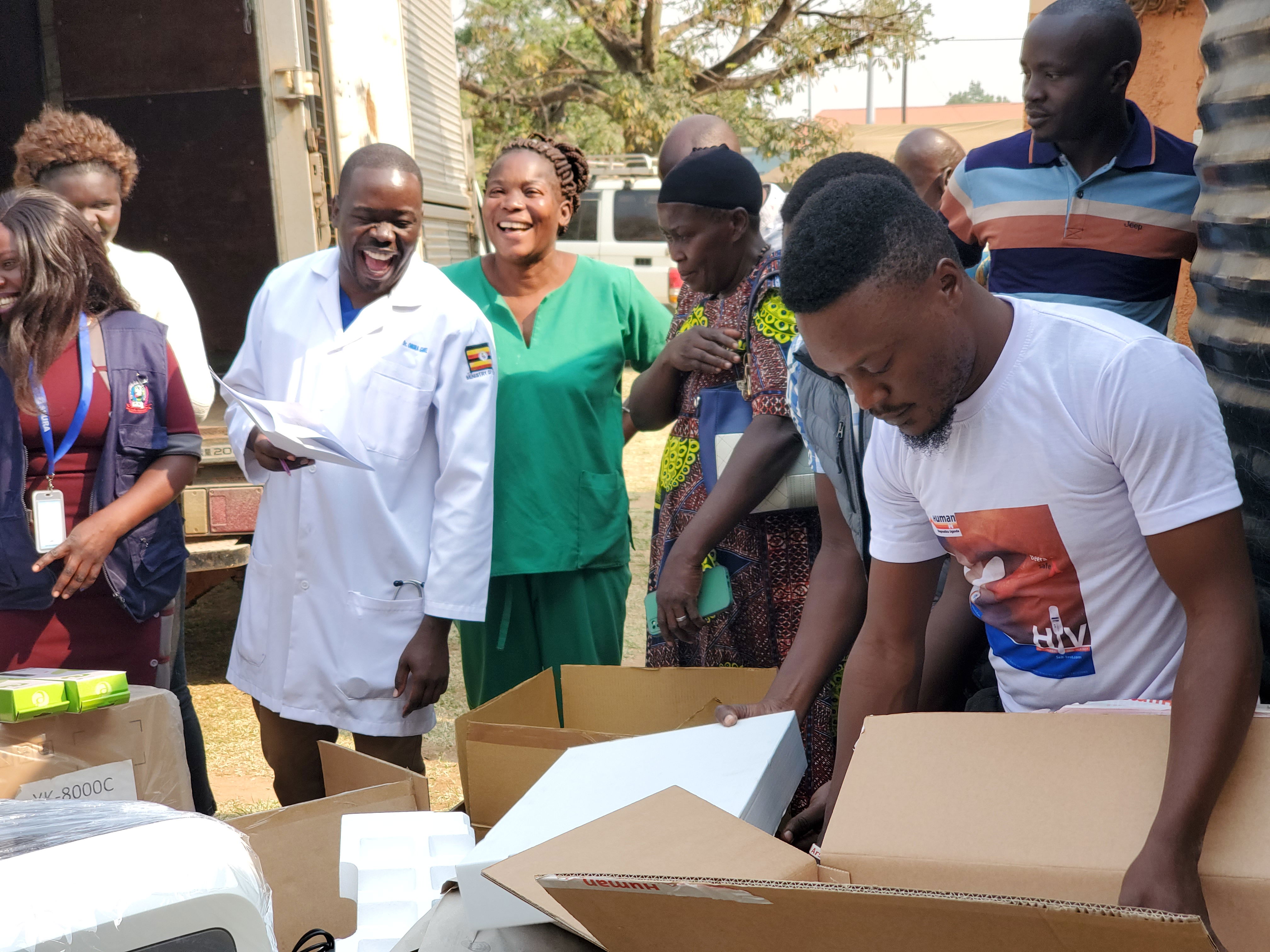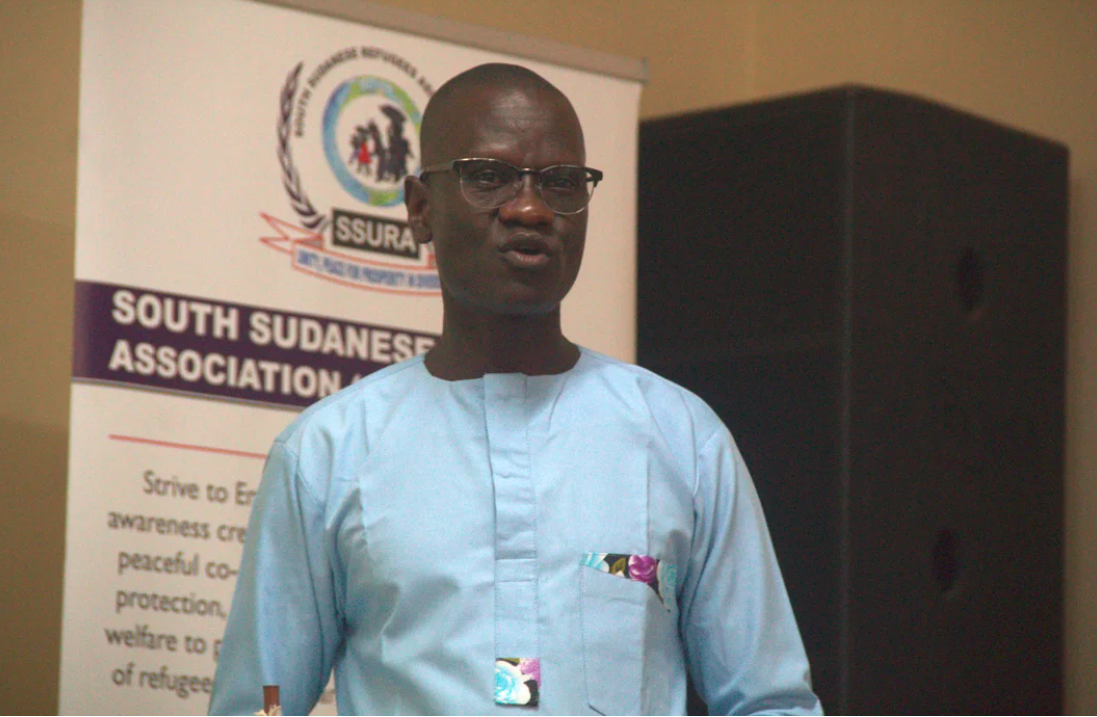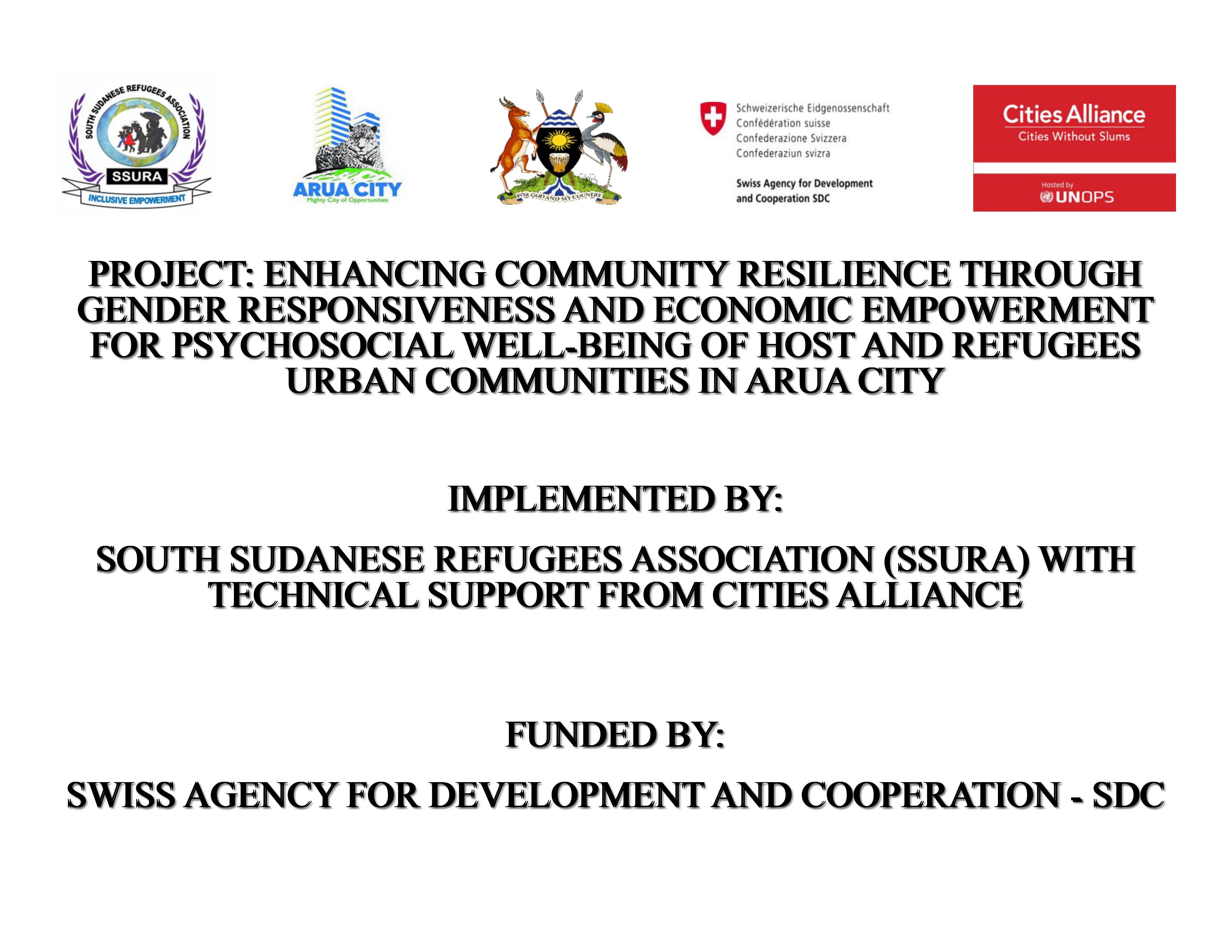SSURA Boosts Oli Health Center IV with 93.8 Million Health Equipment Donation
In a significant move towards enhancing healthcare services for urban refugees, migrants, and host communities, the South Sudanese Refugee Association (SSURA) has delivered a substantial amount of medical equipment worth 93,710,000.00 UGX million to Oli Health Center IV in Arua City.
The delivery, which took place on January 17, 2024, is part of the three-year Swiss Agency for Development and Cooperation - SDC -funded project with Technical Support From Cities Alliance aimed at refurbishing and enhancing the medical theater at Oli Health Center IV, ultimately improving access to maternal health services.

SDC and Cities Alliance Logos
Among the vital medical equipment delivered are a multi-parameter patient monitor, a Huma Star 200 Chemistry Analyzer, blade holders, laparotomy equipment, delivery sets, theater drums, suction machines, operating tables, and a diathermy machine. These supplies are crucial in improving the quality of healthcare services provided to the diverse communities in Arua City and the broader West Nile region.
Mr. Batali Gabriel, the Project Officer at the South Sudanese Refugee Association (SSURA), emphasized the importance of the delivered medical supplies.
I am happy that finally today the equipment delivery has been successful. This will help to address the challenges refugees, migrants, and host communities have been facing in accessing health care at the facility of Oli Health Center, coupled with how Oli Health Center has been a hotspot for urban refugees, said Mr. Batali.

Mr. Batali Gabriel Modi, In Cap, Inspecting the Equipment Before Handing Over to The Management Of Oli HCIV
Mr. Batali further stressed that one of the most important pieces of equipment is the Chemistry Analyzer which is rarely found in Health Center IV but mostly in Referral hospitals, meaning Oli HCIV is lucky. These pieces of equipment were meant to be delivered last year but were delayed due to the fact that the supplier had to import them from abroad as they could not be found locally.
The equipment, including a patient monitor, Huma Star 200 Chemistry Analyzer, surgical instruments, and more, aligns with the project's objective of strengthening healthcare infrastructure, training professionals, and integrating mental health and psychosocial support services.

Dr. Obore working at Oli HCIV, and the staff full of Smiles As they Receive The Delivered Equipment
The successful medical equipment delivery as of today, is a crucial step in elevating Oli Health Center IV to a fully fledged Health Center IV.
The project, funded by the Swiss Agency for Development and Cooperation (SDC), focuses on enhancing community resilience through gender-responsive and economically empowering initiatives.
The collaboration includes key partners such as Arua City Council, the West Nile Development Agency (WENDA), Equity Bank Uganda Limited, and the Office of the Prime Minister (OPM).

Logo Of the Consortium Partners
The collaborative approach ensures a holistic and comprehensive implementation of the project, leveraging the expertise and resources of each organization involved. Arua City's role as a key consortium partner has been pivotal, with the City Council authorizing the release of land for project activities at Oli Health Center IV.
Executive Director Mr. Malish Bonjira expressed gratitude for the successful delivery, acknowledging the support from SDC, Cities Alliance, Arua City, and OPM. He highlighted the positive impact the equipment would have on healthcare services in Arua City and the wider West Nile region.
In his official statement to the media, he said: As the Executive Director of SSURA, I would like to extend a special message to Oli Health Center IV and the general public on the delivery of the medical equipment to the health center. We are pleased to announce that the much-needed medical equipment has been successfully delivered to Oli Health Center IV today, January 17, 2024.
This equipment will greatly enhance the quality of healthcare services provided to the host and refugee communities in Arua City and the West Nile region at large.
We express our sincere gratitude to SDC for funding the project, Cities Alliance for the technical support, Arua City for sincerely accepting the implementation of the project in the city and specifically Oli Health Center IV, OPM for ensuring implementation is hands-on, and all stakeholders involved.
We look forward to seeing the positive impact the equipment will have on the health and well-being of the people in our community and the security of the equipment as it is delivered to generations after the project period. Thank you for your support and collaboration in making this possible.

Looking ahead, SSURA plans to construct a Trauma Healing and Counseling Center and an accommodation unit for midwives on duty. These initiatives aim to improve mental health and well-being for urban refugees, migrants, and host communities. The trauma center will also serve as a data collection center for new arrivals, contributing to a more comprehensive understanding of the needs of displaced individuals.
Mrs. Oweru Joan, the counselor (SSURA staff), revealed plans to deploy additional staff at Oli Health Center to address existing manpower challenges. Despite the difficulties faced by the current health workers, she appealed for dedication to duty. Mr. Malish Bonjira emphasized ongoing efforts to recruit more staff, particularly in pediatric care, indicating SSURA's commitment to supporting the local healthcare workforce.
Oli Health Center IV, previously lacking key equipment, plays a crucial role in the healthcare landscape of Arua City. As the region experiences a surge in population, the delivery of advanced medical equipment is a significant boost.
- Understanding the context, the population of Arua City has been on the rise, with projections indicating substantial growth. The influx of migrants and refugees and the urban surge have intensified the need for improved healthcare facilities. Oli Health Center IV's transformation aligns with the city's evolving demographic landscape.

Management Of Oli HCIV: Inspecting Some of the delivered Equipment
KEY TO NOTE:
South Sudanese Refugee Association (SSURA), as of April 1, 2023, received a grant of over 2.6 billion for a 3-year project for gender responsiveness and economic empowerment launched in Arua city

June 14th 2023 New Vision Article on the Cities Alliance Grant To Arua Through SSURA
Oli Health Center forms part of the 215 (3.36%) Health Centre IVs in Uganda; however, in the recent past, the facility lacked key equipment that limited her capacity as a fully-fledged health center IV. The delivery therefore comes as a key boast to Oli Health Center IV.
There has been a constant push to elevate Oli Health Center IV to be a city-level (district-level) hospital as the influx at Arua Regional Referral Hospital continues to hit a toll as the migrant, refugee, and host population continues to surge, creating the urban surge created by the elevation of Arua City as a regional city as of 2020.
As of 2016, the Arua district by then had an estimated population of 820,500, of which 36,731 9 (4.5%) were refugees. By May 2017, Arua had hosted 151,039 refugees, accounting for 18 percent of the district population. The refugees, mainly from South Sudan, are of diverse ethnic backgrounds: Dinka's, Kuku, Nuer, Kakwa, Madi, and Siluk, and have close ethnicity with the locals, who are Kakwa, Madi, Alur, and Lugbara.
This partly explains the peaceful coexistence in the community. Arua and Koboko promote the government’s exemplary refugee settlement model that allows refugees to interact freely and set up investments, which provides an opportunity to harness their potential to accelerate local economic development.
From the above analysis, the population of the host and refugee communities exerts a heavy burden on health care and social service delivery. Furthermore, Arua has a young population that requires considerable investment in services for both the young and elderly in terms of service delivery, like health facilities, education, roads, markets, and production services.
In conclusion, SSURA's initiative, backed by the Cities Alliance-funded project, stands as a testament to the positive impact collaboration and targeted interventions can have on healthcare delivery in vulnerable communities. As the project unfolds, it promises to bring about lasting improvements in the health and well-being of the people in Arua City and the broader West Nile region.

BY: Aldo ADOMATI, Communications Officer, ssura-ug.org


